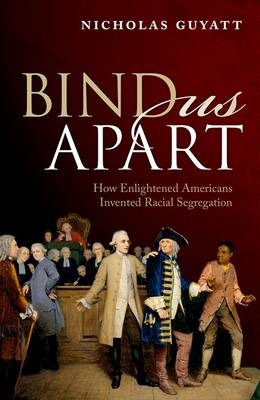
Bind Us Apart
How Enlightened Americans Invented Racial Segregation
Seiten
2016
Oxford University Press (Verlag)
978-0-19-879654-1 (ISBN)
Oxford University Press (Verlag)
978-0-19-879654-1 (ISBN)
The study of USA's on-going failure to achieve true racial integration, Bind Us Apart shows how, from the Revolution through to the Civil War, white American anti-slavery reformers failed to forge a colour-blind society.
The surprising and counterintuitive origins of America's racial crisis
Why did the Founding Fathers fail to include blacks and Indians in their cherished proposition that "all men are created equal"? The usual answer is racism, but the reality is more complex and unsettling. In Bind Us Apart, historian Nicholas Guyatt argues that, from the Revolution through the Civil War, most white liberals believed in the unity of all human beings. But their philosophy faltered when it came to the practical work of forging a colour-blind society. Unable to convince others - and themselves - that racial mixing was viable, white reformers began instead to claim that people of colour could only thrive in separate republics: in Native states in the American West or in the West African colony of Liberia.
Herein lie the origins of "separate but equal." Decades before Reconstruction, America's liberal elite was unable to imagine how people of colour could become citizens of the United States. Throughout the nineteenth century, Native Americans were pushed farther and farther westward, while four million slaves freed after the Civil War found themselves among a white population that had spent decades imagining that they would live somewhere else.
The surprising and counterintuitive origins of America's racial crisis
Why did the Founding Fathers fail to include blacks and Indians in their cherished proposition that "all men are created equal"? The usual answer is racism, but the reality is more complex and unsettling. In Bind Us Apart, historian Nicholas Guyatt argues that, from the Revolution through the Civil War, most white liberals believed in the unity of all human beings. But their philosophy faltered when it came to the practical work of forging a colour-blind society. Unable to convince others - and themselves - that racial mixing was viable, white reformers began instead to claim that people of colour could only thrive in separate republics: in Native states in the American West or in the West African colony of Liberia.
Herein lie the origins of "separate but equal." Decades before Reconstruction, America's liberal elite was unable to imagine how people of colour could become citizens of the United States. Throughout the nineteenth century, Native Americans were pushed farther and farther westward, while four million slaves freed after the Civil War found themselves among a white population that had spent decades imagining that they would live somewhere else.
Nicholas Guyatt is a University Lecturer in American History at the University of Cambridge. He is the author of numerous books and articles on the history of the United States, including Another American Century: The United States and the World after 9/11 (Zed Books, 2003), Have a Nice Doomsday: Why Millions of Americans are Looking Forward to the End of the World (Random House/Harper Collins, 2007), and most recently Providence and the Invention of the United States (CUP, 2007).
MAPS; INTRODUCTION; PART I: DEGRADATION; PART II: AMALGAMATION; PART III: COLONIZATION; EPILOGUE; ACKNOWLEDGMENTS; NOTES; INDEX
| Erscheinungsdatum | 27.08.2016 |
|---|---|
| Zusatzinfo | 18 black & white illustrations and 3 maps |
| Verlagsort | Oxford |
| Sprache | englisch |
| Maße | 176 x 234 mm |
| Gewicht | 750 g |
| Themenwelt | Geschichte ► Allgemeine Geschichte ► Neuzeit (bis 1918) |
| Geisteswissenschaften ► Geschichte ► Regional- / Ländergeschichte | |
| Geschichte ► Teilgebiete der Geschichte ► Kulturgeschichte | |
| Geschichte ► Teilgebiete der Geschichte ► Wirtschaftsgeschichte | |
| Sozialwissenschaften ► Ethnologie | |
| Sozialwissenschaften ► Soziologie | |
| ISBN-10 | 0-19-879654-4 / 0198796544 |
| ISBN-13 | 978-0-19-879654-1 / 9780198796541 |
| Zustand | Neuware |
| Haben Sie eine Frage zum Produkt? |
Mehr entdecken
aus dem Bereich
aus dem Bereich
Europa 1848/49 und der Kampf für eine neue Welt
Buch | Hardcover (2023)
DVA (Verlag)
CHF 67,20
Giordano Bruno - ein ketzerisches Leben
Buch | Hardcover (2024)
C.H.Beck (Verlag)
CHF 41,85


